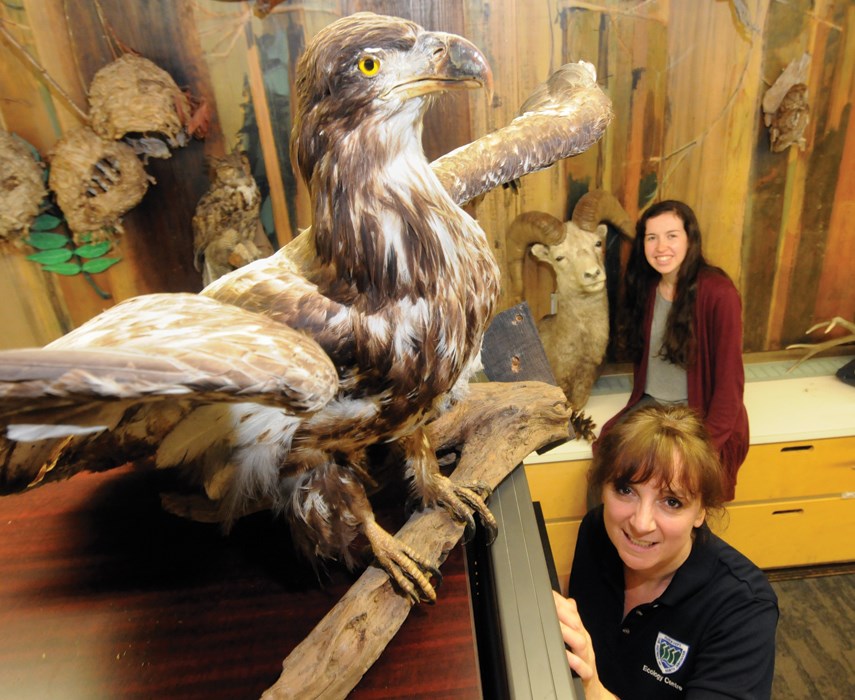For five decades, it’s been bringing us home to nature.
On Oct. 2, 1971, Lynn Canyon Ecology Centre opened its doors to local visitors, tourists from around the world and busloads upon busloads of school kids.
“It's a real thing to celebrate,” said Michalle Martin, supervisor of the ecology centre.
The centre was the brainchild of Dirk Oostindie, a former head of the District of North Vancouver parks department who started by giving slide show presentations to visitors in Lynn Canyon Park, just steps from one of the North Shore’s natural wonders.
“He just literally had a sheet and a projector,” Martin said.
Underlying the creation of the dogwood flower-shaped building was his belief that people who understand and appreciate their role in a complex web of life will take the steps needed to protect that web.
“The word ‘ecology’ means learning about the home you live in,” Martin said. “Everybody needs to learn about the home they live in.”
In 1971, questioning whether industrialized society was sustainable was still radical, said Oostindie’s son Irwin, and so was dedicating a public building to that kind of education.
“Issues like the survival of the planet, certainly 50 years ago, were not always popular lines of questioning, but here we are five decades later and it's the question of our civilization,” he said. “For civic infrastructure and a centennial project, that was a bold move 50 years ago and certainly ahead of its time.”
On the same day in 1971, the Baden Powell trail opened, which Oostindie was also behind. And he’s credited with persuading council to open Maplewood Farm, Canada’s first public skate park in Seylynn, and the first sports field complex to be built on a former landfill at Inter River Park.
“He believed civic infrastructure could be critical, innovative and inclusive,” Irwin said.
Under normal circumstances, the ecology centre attracts about 85,000 visitors per year from roughly 70 different countries.
Like many North Vancouver residents, Mayor Mike Little said he has many fond memories there, both visiting as a child and taking his own kids to interact with the exhibits.
“There's a few facilities you remember from when you were a little – the Lynn Valley library, the Ron Andrews pool, and definitely the ecology centre. I spent a lot of time up there,” he said. “It's a great centre for learning and promoting ecological education in our community.”
Martin said she routinely sees people making the kinds of connections Oostindie had in mind. She recalled one woman who saw novelty twig pencils in the gift shop and wanted to know if she could make her own by whittling a stick outside.
“Sometimes the disconnect is really astounding for people,” she said.
Martin said she personally always revels in teaching visitors about the relationship between bears, salmon and the temperate rainforest. Bears that come to creek banks to fish leave carcasses behind, which provides critical fertilizer to the trees.
“They share that protein hundreds of miles inland. That's why the forests here are so big. Eighty per cent of the nitrogen that grows our trees comes from salmon. If you take the bears out the forest, the trees wouldn’t grow so tall,” she said. “People are always astounded that everything is so connected, which I love. I think it's exciting.”
That, and other similar messages bear repeating, again and again until we get it, Martin said. In the 50 years since the centre opened, the human population has swelled but the number of land mammals on the planet has dropped by 60 per cent.
“I think, well, maybe we're not doing such a good job, but we're not giving up,” Martin said. “It's a big, big world for us, really, and saving the planet, that's always our goal, right? Looking after it, keeping it healthy. It gets us up every day.”
To mark their 50th, the centre has been hosting special exhibits, offering guided nature walks and programs aimed at families all this week. For times and details, visit the Lynn Canyon Ecology Centre's website.


